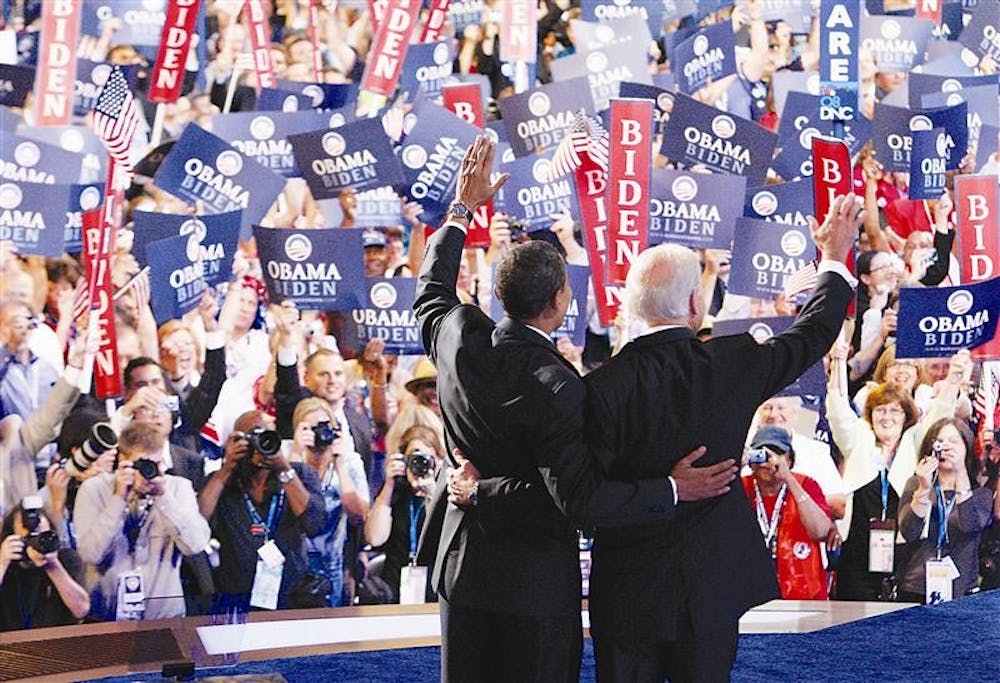DENVER – Barack Obama was officially chosen as the Democratic nominee for president Wednesday, making the Illinois senator the first black nominee from either of the two major political parties. The vote also brings to a close a hard-fought battle for the nomination that saw the two front runners – Obama and Sen. Hillary Clinton, D-N.Y., – contest states like Indiana that had been largely irrelevant in previous elections.
Delegates at the Democratic National Convention in Denver began voting Wednesday afternoon. But instead of taking votes from every delegation, when the roll call for delegate votes was passed to New York, Clinton motioned for a consensus vote, which was met with a roar from the Pepsi Center crowd.
Sen. Evan Bayh, D-Ind., gave Obama a ringing endorsement during his speech early Wednesday evening, citing problems in Indiana and across the Midwest that he said the first-term senator is equipped to combat.
“Barack Obama offers specific ideas to help struggling middle-class families meet the challenges they face each and every day,” Bayh said. “He will create more than five million new green-collar jobs, including ... Midwestern farmers producing America’s fuel. He will invest in hybrid technology and alternative energy.”
Endorsements of energy sources like corn-based ethanol could win over Midwestern voters looking for a boost in a faltering economy.
Obama’s running mate, Sen. Joe Biden, D-Del., stuck with the Obama campaign’s biggest theme: change.
“Obama has tapped into the oldest American belief of all,” Biden said a few minutes before the Illinois senator made a surprise appearance onstage. “We don’t have to accept the situation we cannot bear. We have the power to change it.”
Obama’s nomination comes after one of the closest-fought primary seasons in recent years. He and Clinton were at odds until June 7, four days after the last primaries, when Clinton conceded, having hoped to secure the nomination through superdelegates.
Former President Bill Clinton, who was criticized for appearing angry and frustrated when Obama’s campaign overtook Sen. Hillary Clinton’s, put aside his support for his wife and tried to answer some of the barbs thrown at Obama by Republicans – especially what conservatives see as Obama’s lack of experience.
“He has a remarkable ability to inspire people, to raise our hopes and rally us to high purpose,” Clinton said. “He has the intelligence and curiosity every successful president needs. His policies on the economy, taxes, health care and energy are far superior to the Republican alternatives.”
With the formal nomination locked up, the son of a white mother from Kansas and a black father from Kenya will intensify his efforts to call for a change in direction after eight years of President George W. Bush. Obama, who appeared in Bloomington twice last spring and lost the Indiana primary by less than 1.5 percent, has built much of his campaign on attracting young voters, especially college students. His April visits to the women’s Little 500 and Nick’s English Hut were met with wild enthusiasm by IU students.
Obama’s formal nomination is a milestone in the racial history of the United States, but references to his race have been conspicuously muted this week. Jesse Jackson Jr., son of the notable civil rights leader, avoided any reference to Obama’s race, as did other black speakers during the first three days of the convention.
Obama will take the stage down the street from the Pepsi Center at INVESCO Field at Mile High tonight, delivering his acceptance speech to a stadium full of 70,000-plus Democrats at the last night of the convention. He told reporters earlier Wednesday that his speech will shy away from political rhetoric and focus on helping “middle class families live their lives.”
Obama officially 1st black nominee
Milestone marks end of long, historic primary battle with Clinton

Get stories like this in your inbox
Subscribe



